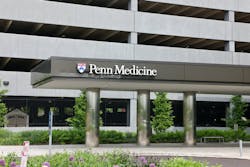Pa. Hospital Consolidation Continues With Penn Medicine-Doylestown Deal
Just weeks after Philadelphia-based Jefferson Health and Allentown, Pa.-based Lehigh Valley Health Network (LVHN) announced plans to merge, the University of Pennsylvania Health System (UPHS) and Doylestown Health leaders announced plans for the Bucks County health system to become part of Penn Medicine.
Doylestown Health is a not-for-profit, clinically integrated network of care, with its flagship being 247-bed Doylestown Hospital, which would become the seventh Penn Medicine hospital. In addition to its three Philadelphia hospitals — the Hospital of the University of Pennsylvania, Penn Presbyterian Medical Center, and Pennsylvania Hospital — Chester County Hospital, Lancaster General Health, and Princeton Health are part of UPHS, having joined in 2013, 2015, and 2018, respectively.
“Penn Medicine aims to provide options for patients everywhere in our region, no matter where they live. From receiving primary care and having a baby to undergoing orthopedic surgery or receiving complex treatment for cancer or heart disease, we want it to be easy for patients to choose Penn Medicine across their lifespan,” said UPHS CEO Kevin Mahoney, in a statement. “We are excited to explore this opportunity with Doylestown Health, which has a strong, historic commitment to patients in the Northern region of the areas we serve.”
The organizations said the new partnership will build upon existing clinical integration between UPHS and Doylestown Health. Penn Radiation Oncology at Doylestown, for instance, opened in 2011 and delivers care for more than 400 patients each year. For more than a decade, Doylestown Hospital has been part of the Penn Cancer Network, a group of hospitals and physician practices throughout the greater Philadelphia region collaborating with Penn Medicine's Abramson Cancer Center to provide expanded access to treatments and clinical trials.
Penn Medicine noted that the announcement of the proposed partnership is a preliminary step in a process that will last several months. Once due diligence is completed and definitive agreements have been signed, the plans will be reviewed by all necessary federal and state regulators.
The same holds true for the Jefferson-Lehigh Valley deal. That combined system would operate 30 hospitals and more than 700 sites of care, supported by more than 62,000 employed faculty, clinicians and staff in Eastern Pennsylvania and Southern New Jersey.


